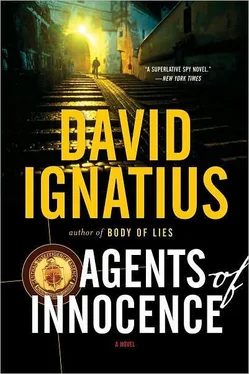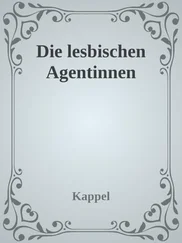David Ignatius - Agents of Innocence
Здесь есть возможность читать онлайн «David Ignatius - Agents of Innocence» весь текст электронной книги совершенно бесплатно (целиком полную версию без сокращений). В некоторых случаях можно слушать аудио, скачать через торрент в формате fb2 и присутствует краткое содержание. Жанр: Шпионский детектив, на английском языке. Описание произведения, (предисловие) а так же отзывы посетителей доступны на портале библиотеки ЛибКат.
- Название:Agents of Innocence
- Автор:
- Жанр:
- Год:неизвестен
- ISBN:нет данных
- Рейтинг книги:3 / 5. Голосов: 1
-
Избранное:Добавить в избранное
- Отзывы:
-
Ваша оценка:
- 60
- 1
- 2
- 3
- 4
- 5
Agents of Innocence: краткое содержание, описание и аннотация
Предлагаем к чтению аннотацию, описание, краткое содержание или предисловие (зависит от того, что написал сам автор книги «Agents of Innocence»). Если вы не нашли необходимую информацию о книге — напишите в комментариях, мы постараемся отыскать её.
Agents of Innocence — читать онлайн бесплатно полную книгу (весь текст) целиком
Ниже представлен текст книги, разбитый по страницам. Система сохранения места последней прочитанной страницы, позволяет с удобством читать онлайн бесплатно книгу «Agents of Innocence», без необходимости каждый раз заново искать на чём Вы остановились. Поставьте закладку, и сможете в любой момент перейти на страницу, на которой закончили чтение.
Интервал:
Закладка:
Shuval, the station chief, took Levi out to dinner the night before he left for Syria. They drove in separate cars to Chtaura, halfway to the border, and ate at a Lebanese restaurant there. It was the chief’s way of holding Levi’s hand as long as he could before letting him go. They talked in French through the dinner. Shuval laughed and told jokes about the life Levi would be leading in a few months, when he went back home. The girls on the beach. The loud talk and laughter in the streets. All the sights and sounds and fellowship of that other place, which the chief never named.
The organization had promised Levi the moon. When he got back to Tel Aviv, he would be a senior deputy in the section they called Tzomet- Junction-that handled the collection and analysis of intelligence. His specialty would be analyzing information about the Palestinian guerrilla groups. With a nice raise in pay, and a down payment for a new apartment in Herzliya. How did that sound? Didn’t that make it all a little more bearable? What they were really saying was: Hang on. Keep it together for a few more months and you can put your Maalox away in the drawer. We’re bringing you home.
Levi picked at his food in the restaurant in Chtaura. He pushed the humous back and forth on his plate with the pita bread. He cut his kibbeh into smaller and smaller pieces, but ate only the pine nuts and the spiced-lamb filling. He looked awful. Tired, frayed nerves. And he hadn’t even started the run yet.
The station chief embraced Levi when the dinner was over.
“See you in a week,” he said.
“Insha ‘Allah,” said Levi, not really meaning it as a joke. If it pleases Allah.
The chief drove back to Beirut. Levi went to his room in a small tourist hotel in Chtaura and slept fitfully. He rose at dawn to the sound of two taxi drivers arguing over a fare. They were screaming at each other so loudly and angrily that Levi worried, as he shaved, that one of them might start shooting. A policeman arrived and the fight ended. Levi breakfasted and headed for the border.
Levi reached the border before 9:00 A.M. Syrian customs officers dressed in khaki uniforms were questioning drivers and searching their cars. They weren’t the problem. The dangerous ones were the security officers at passport control.
Levi went through his final checklist as he braked the car near the checkpoint. He was Jacques Beaulieu, totally and completely. He saw the images of his cover identity in his mind as if he was looking at snapshots. His imaginary parents, brothers and sisters, friends from Marseilles. He knew what each of them looked like. Hair color, eye color, height, and weight. It was a game he played, like a blind man inventing the shapes and colors of his world.
Levi’s commercial cover was easier, because it was all real. The man carrying the passport in the name of Jacques Beaulieu traded goods throughout the Mediterranean, there were hundreds of people who could attest to it. He was coming to Syria to negotiate a contract for exporting agricultural products. It was true, he had the papers in his briefcase, the contract typed and ready to sign. He was a trader. That’s all he was. Who could prove otherwise? His identity fit as smoothly and tightly as a silk glove.
Levi parked his Citroen sedan. He got out and walked to the passport-control office at the border. He stood in the shortest line. In a minute-too quick-he was standing at the window. His knees felt weak when he looked at the passport-control officer. He steadied himself by remembering the snapshots of his fictitious father and mother.
“Papers!” growled the Syrian officer. He was unshaven and had a cigarette dangling from his lips.
Levi handed the Syrian officer his French passport and his Lebanese residency card. In theory, the residency card allowed him to come and go in Syria at will. That was one of the benefits of the Baath Party’s claim to sovereignty over Greater Syria. They didn’t recognize, officially, the existence of a separate nation of Lebanon. But that was only in theory.
The border guard looked at Levi suspiciously. Don’t panic, Levi told himself. They always do that. The guard was looking in a thick book covered with Arabic writing. Shit! Why the delay? What was he looking for? Was Levi on a watch list? The security man looked at Levi again through hooded eyes. Despite himself, despite all his preparation, Levi was trembling. He bit his lip hard and put his hands in his pockets so the guard couldn’t see them shaking. I’m not going to make it, Levi told himself. This is one trip too many. I’m a dead man.
The guard was writing something down in a book. Levi looked away. Shit. Shit! Here it comes.
But Levi was wrong. The guard was handing him back his papers and waving him on. The man behind him in line was pushing toward the window. Levi apologized in French. Pardon, pardon. He returned to his Citroen and drove it to the customs-inspection line. The hard part was over, he told himself. The customs men were cheap thugs. Sometimes they wanted a bribe. But they didn’t want to kill Levi.
Levi got through easily, letting the customs man “confiscate” a carton of French cigarettes. He always carried extra cartons, more than he needed, as a distraction for wayward policemen. And then he was off. Levi relaxed in the overstuffed seat of the Citroen, feeling the sweat from his armpits drip down his sides. He had survived another hour in his eternity of fear.
Levi drove east toward Damascus, then north on the main highway to Aleppo. He was a French businessman, on a business trip. He smoked cigarettes, one after another, and turned his car radio on loud. It was a Syrian station, playing a ballad by Fayrouz about how the Arabs would someday recapture Jerusalem. “The gates of Jerusalem will not remain closed to us,” sang Fayrouz. “We will rebuild you with our own hands. Jerusalem, we salute you.” Levi knew the tune. He sang along.
Levi had a momentary fright, outside Homs, when he flipped the radio dial and caught the sound of a Hebrew voice on Israeli radio. It was a jingle for a new bank. It was a catchy tune, and Levi found himself singing it in Hebrew. That’s what made him panic. In that idle moment of singing, his true identity had ruptured through the fine membrane of his cover. He willed himself to forget the tune, forget the words, forget the Hebrew language itself, for another few days.
He stopped for lunch in Hama, in a small outdoor cafe by the River Orontes. He sat by the stream, eating a veal cutlet, looking at the old waterwheels that lined the banks. Out of the corner of his eye, he noticed a military officer, dressed in the camouflage uniform of the internal security forces, examining his car. It’s normal, he told himself. They check all cars with foreign tags. It’s routine. The officer took out a pad and wrote something. Probably the license number. The officer continued walking and stopped at another car with Lebanese tags, this one a Mercedes. He wrote down the license numbers of that one, too. That was the peculiar advantage of operating in a police state, Levi decided. They were watching you always, it was true. But they were watching everyone else, too.
Levi reached Aleppo that night and checked into the Hotel Hovsepian. It was a fine old pile of a hotel, built by a distinguished Armenian family that had come to Aleppo in the late nineteenth century. Levi sat in the bar and swapped stories with the owner, not telling too much about himself-that would seem odd-but revealing just enough to embellish his cover when the Surete stopped by that night to inquire about the names on the hotel guest list.
Levi was awakened the next morning by the sound of the muezzin. He had read once in a guidebook that Aleppo was called the city of a thousand mosques. This morning, it sounded as if all one thousand were just outside his hotel room. He bathed, ate a leisurely breakfast, and asked the concierge for tips on local sightseeing. Then he left the hotel to collect the first of his four drops.
Читать дальшеИнтервал:
Закладка:
Похожие книги на «Agents of Innocence»
Представляем Вашему вниманию похожие книги на «Agents of Innocence» списком для выбора. Мы отобрали схожую по названию и смыслу литературу в надежде предоставить читателям больше вариантов отыскать новые, интересные, ещё непрочитанные произведения.
Обсуждение, отзывы о книге «Agents of Innocence» и просто собственные мнения читателей. Оставьте ваши комментарии, напишите, что Вы думаете о произведении, его смысле или главных героях. Укажите что конкретно понравилось, а что нет, и почему Вы так считаете.












